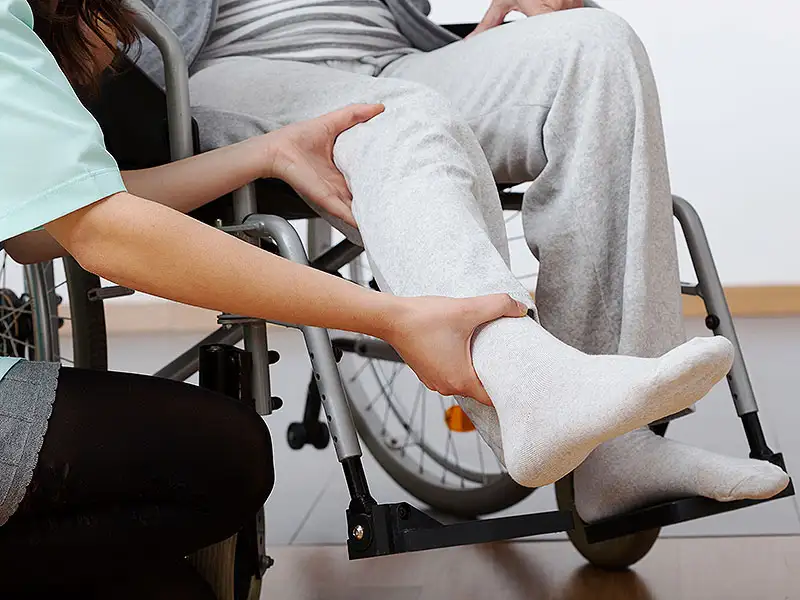Multiple Sclerosis
"THE SPECIFIC CAUSE OF MULTIPLE SCLEROSIS IS UNKNOWN. The most widely accepted theory is that multiple sclerosis is an autoimmune disease that preferentially destroys the CNS while the peripheral nervous system is spared"
MULTIPLE SCLEROSIS is an autoimmune disease of the central nervous system (CNS) characterized by chronic inflammation, demyelination, gliosis, and neuronal loss. The course may be relapsing-remitting or progressive in nature. Lesions in the CNS occur at different times and in different CNS locations. Because of this, multiple sclerosis lesions are sometimes said to be “disseminated in time and space.” The clinical course of the disease is quite variable ranging from stable chronic disease to a rapidly evolving and debilitating illness. The most common form of the disease is relapsing-remitting multiple sclerosis; however, several other forms exist

5 Common Sign & Symtoms of Multiple Sclerosis
(1) Numbness and weakness in one or several limbs progressing from paresthesis
(2) Visual disturbances such as double vision, atrophy of one optic nerve
(3) Impaired ocular movement
(4) Fatigue is typically the early symptoms that will present with MS
(5) Pain- Headache, chronic neuropathic pain, paroxysmal limb pain
Factors all appear to have a role in MULTIPLE SCLEROSIS development:
Don't Ignore These!
[1] IMMUNOLOGIC FACTOR
The body’s immune cells attack the CNS and ultimately destroy nerve conduction. The T cells (the white blood type in the immune system) somehow become sensitized to proteins in the CNS. When T cells are activated, the CNS enters through blood vessels and produce damaging inflammation
[2] ENVIRONMENTAL FACTOR
MS is more prevalent in areas farther from the equator in colder climates. Vitamin D plays an important role where people living in climates that are more exposed to the sun, their bodies naturally produce more vitamin D. The vitamin D improve immune function and protect the body from autoimmune diseases
[3] GENETIC FACTOR
The risk of MS increases in a person who has a first-degree family member with the disease, however, MS is not considered to be hereditary.
[4] INFECTIOUS FACTOR
There is a possibility that viruses and other infectious agents may trigger the onset of MS. The argument of virus cause is supported by the presence of oligoclonal bands in the brain and cerebrospinal fluid, which persists throughout the lifetime. The presence of oligoclonal bands is found exclusively in infectious CNS disorders
[5] GUT MICROBIOME FACTOR
The gastrointestinal microbiota may play an important role in the pathogenesis of MS. According to the “hygiene hypothesis”, reduced exposure to infections in childhood can increase the risk of allergic and autoimmune diseases. Intestinal bacteria can also affect the integrity of the blood-brain barrier. However it is difficult to say with certainty whether changes in the intestinal microbiota are the cause or consequence of MS because MS patients have immunological and microbial changes several months to years before the onset of clinical disease.
We are ready to help.
How Physiotherapy Help?

![]() STRENGTH AND AEROBIC TRAINING – The resistance training program is recommended for maintaining bone and muscle mass. This training is carried out regularly and with sufficient intensity, have evidence of improvement in patients with MS. Exercise improves impairments of aerobic capacity, lower extremity muscle strength, fatigue, and depression; reduced activity limitations such as walking performance and balance; and confirms that it positively impacts quality of life.
STRENGTH AND AEROBIC TRAINING – The resistance training program is recommended for maintaining bone and muscle mass. This training is carried out regularly and with sufficient intensity, have evidence of improvement in patients with MS. Exercise improves impairments of aerobic capacity, lower extremity muscle strength, fatigue, and depression; reduced activity limitations such as walking performance and balance; and confirms that it positively impacts quality of life.
![]() Aquatic exercise programs – have a positive effect on persons with progressive multiple sclerosis. It promotes general health, improves energy levels and mental health, and aids social interaction in the presence of physical disability.
Aquatic exercise programs – have a positive effect on persons with progressive multiple sclerosis. It promotes general health, improves energy levels and mental health, and aids social interaction in the presence of physical disability.
![]() Specific balance exercises – can improve balance. Poor postural control increases the risk of falls. MS patients have increased sway in quiet stance, delayed postural perturbations and reduced ability to move towards limits of stability.
Specific balance exercises – can improve balance. Poor postural control increases the risk of falls. MS patients have increased sway in quiet stance, delayed postural perturbations and reduced ability to move towards limits of stability.

